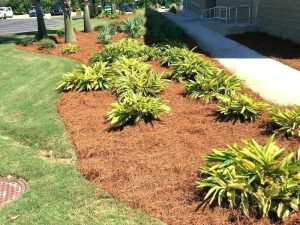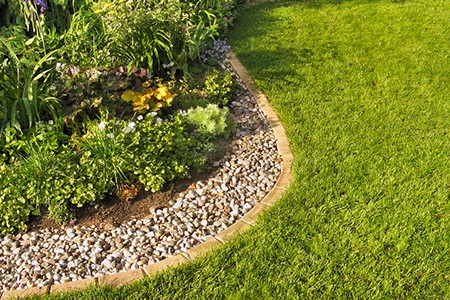When it comes to landscaping your garden bed, flower bed, trees, or plants, mulching plays a crucial role. Mulching has a host of benefits to the soil, which include improving soil quality.
Often, gardeners experience a lot of issues when looking for good mulch alternatives. These range from, soil erosion, poor soil nutrition, and loss of soil moisture to imbalances in soil temperature. To avoid any such issue, you need to landscape properly using mulch or other alternatives.
To help you with that, here I bring some of the best landscaping mulch alternatives.
Here are five best alternatives to mulch for landscaping
1. Pine needles

Pine needles are perfect for home gardening.
They have a thick protective covering that help retain water during a torrential downpour. This allows moisture to penetrate the pine needles while preventing soil erosion and keeping water trapped where necessary.
Besides, it prevents light from reaching the weed, hence slowing down their growth. Since pine needles decompose, they tend to add organic material to the soil and aerate it as well. They are thus improving both soil quality and drainage.
And unlike bark mulches, pine needles do not add too many minerals to the soil.
To ensure proper landscaping, you can just spread the pine bark mulch around plants and trees in your garden.
Pine needles will give you ultimate results when used correctly.
2. Grass clippings
Grass clippings provide many benefits to landscaping and are absolutely an excellent substitute to mulch.
It allows you to use either Fresh or Dried grass for your landscaping. And it is ideal for use on a lawn or when used as vegetable garden mulch.
Other than its ability to retain moisture, grass clippings help suppress the growth of weeds, improves soil quality, and prevents pests. On top of that, it contains more than enough nitrogen and potassium. So, it can be used to supplement fertilizers.
Just ensure you do not use grass clippings on lawns that have recently been treated for weeds. This is because herbicides can transfer to clippings and damage your plants.
3. Composts
Composts are suitable for sustainable landscaping among many other uses. And that is something different from other mulch alternatives.
Composts come from waste materials and carbon, and by adding it to the soil, the PH is adjusted. Plus, it increases the number of beneficial microorganisms, improves soil structure, as well as increasing the nutrient level in the soil.
While all composts originate from waste, they are not similar. They mainly vary depending on where they come from. For that reason, it is essential that you understand the aim of the landscape project, the soil, and environmental conditions.
All that is necessary for successful landscaping.
5. Pebbles and rocks

Stone mulch is an excellent mulch substitute as far as landscaping goes. And they come handy in different types.
Pebbles mulch are the most cost-effective ones. Besides, they help add color to your garden and make it look neat, especially during the rainy season.
Others include old traditional rock mulch for perennial garden beds and pumice which is suitable for flowerbeds.
Contrary to other mulch alternatives, rocks and pebbles are known to last longer. Once you put them in place, you do not have to replace them as often as you would with mulch. Plus, they are useful in keeping the soil moist. For instance, lightweight pumice has a tremendous ability to hold water in the ground, and their water retention ability is better than other stone mulches.
Additionally, all kinds of rocks are suitable for preventing soil erosion. Hence this helps the soil to retain its nutrients.
Rocks are good substitutes for mulch. But, it all depends on what kind you feel is more suitable for your garden.
6. Wood chips
If you ask any experienced gardener, what some good substitutes to mulch are, they will mention wood chips.
Wood chips contain leaves, bark, and several tree species, which are responsible for a variety of chemicals within the chips. Hence they are the best way to enhance nutrient level in the soil. This clearly explains why chips are popular for mulching.
Wood chips are ideal for mulching around trees and plants, such as shrubs. And they also help prevent weeds from penetrating mulch layer.
Also, wood chips create a mesh-like layer which helps hold water beneath the surface. If you can adequately apply wood chips around your trees or plants, then you may minimize the need for frequent watering.
Last, but not least, Wood chips can absorb water into the soil, since they do not break down as quickly as shredded mulches.
The mulch alternatives mentioned above are entirely doable, and you can get the maximum landscaping benefits from them when correctly applied. Some may require replacement as often as necessary, while others such as rocks are more permanent, and last longer. Hence, these are all excellent substitutes to mulch.

I like that you said that grass clippings are a better substitute than Mulch. My wife had recently discovered this and I had to look it up. We will need a garden equipment expert to help me out more about Black Landscaping Mulch, that would be nice.